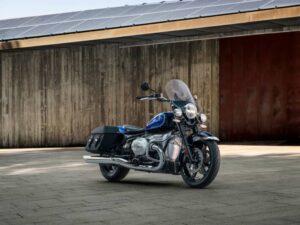Union Says GM, LG's Ultium Battery Plant Needs To Be Safer

Good morning! It’s Monday, July 10, 2023 and this is The Morning Shift, your daily roundup of the top automotive headlines from around the world, in one place. Here are the important stories you need to know.
GM Just Cant Seem To Quit The Chevy Bolt
1st Gear: Ultium Cells Union Wants A Safer Battery Plant
It’s entirely likely the United Auto Workers strikes against at least one of Detroit’s Big Three ahead of the union’s current contract expiring on September 14. UAW also recently organized General Motors and LG’s new Ultium Cells division, and as part of overall negotiations this summer, the union will be petitioning for improved safety protocols.
Twenty-two workers have been injured at the Ohio facility since it began operation last September, according to data supplied by the union to Bloomberg. That works out to 2.2 injuries per 100 workers, double the average for battery plants. Ultium Cells also paid out $68,000 to the Occupational Safety and Health Administration for non-injury claims over that time, twice what another battery supplier, SK, has been fined at its Georgia factory. Here’s some of what’s going on in Warren, courtesy Bloomberg:
Battery-cell plants are more like chemical factories than conventional auto-production facilities, where injuries are more likely to be from machinery accidents or repetitive tasks.
A year ago, a contractor at the Ultium plant was crushed by an automated crane while working inside the plant, suffering serious injuries, according to Travis Eastham, the local fire-station chief. The worker was hospitalized for months and later died of his injuries, Eastham said in a phone interview.
At the time, the company confirmed a subcontractor was injured at the plant, but declined to discuss the incident further.
In a white paper, the union said Ultium worker Gavin Currey was sprayed with toxic gas in early May while working in an area that extracts a poisonous electrolyte compound from battery cells. Currey said in the paper he experienced minor burns to his face and a union official said he was unable to work for three days.
Another worker, Mandy McCoy, told the union she saw a colleague put toxic waste in a garbage can, emitting fumes that made her and a coworker nauseous. McCoy said her colleague was taken to the hospital.
This in addition to another incident at the top of the story, in which a defective battery caught fire:
The workers raced to put it out, and were able to do so, according to the fire department near the facility in Lordstown, Ohio. While no one faced life-threatening injuries, two people were sent to the hospital for smoke inhalation — adding tension to an already strained relationship between the plant’s workers and its managers.
The UAW’s position is that automakers are benefitting from big subsidies for their new battery plants, thanks to Inflation Reduction Act incentives on every vehicle sold. Union members want to see that wealth shared and invested in safety procedures. As it stands, employees under joint ventures like the one GM has with LG at the Ultium facility don’t fall under the UAW’s existing contract with GM, so they’re not paid competitive wages.
When reached out for comment, an Ultium spokesperson reiterated to Bloomberg that “safety is a top priority each day,” and that the plant now has four union members as safety representatives. Back in May, Ultium Cells temporarily suspended four employees in the electrolyte mixing department for refusing to work until a safety shower was installed.
2nd Gear: GM Keeps Its Lead
Two years ago Toyota snapped GM’s streak of leading U.S. new car sales, but GM took the title right back in 2022. We’re only a little more than halfway through 2023, but GM appears poised to widen the gap to second place. From Automotive News:
Through June, GM outsold Toyota Motor North America by nearly 250,000 vehicles, far more than the roughly 42,000 that separated the two in mid-2022, according to the Automotive News Research & Data Center.
The supply constraints that helped Toyota unseat GM in 2021 and that have hindered production throughout the industry for two years are easing, boosting inventory to feed pent-up demand from both fleet and retail buyers, analysts said.
Signs point to continued improvement in the second half of the year. The seasonally adjusted, annualized rate of sales was 15.8 million vehicles in June, at the high end of forecasters’ estimates and the third-highest of the year, according to Motor Intelligence. That’s an improvement from 15.1 million in May and 13.1 million a year earlier, when shortages of semiconductors and other key parts had dealers starving for products.
As the supply chain has recovered, so has GM’s performance. That’s not to say Toyota wasn’t hit by the same constraints; it was just better prepared for them at the onset. Once its stockpile of chips ran out, it fell short just like everyone else.
3rd Gear: Lyriq Hit By China’s EV Price War
In the final part of today’s GM Morning Shift trilogy, Cadillac is slashing prices of the Lyriq in the China to stay competitive, just like everyone else has. From Reuters:
The Lyriq, a luxury crossover based on GM’s Ultium EV architecture, is now priced from 379,700 yuan ($52,466) from 439,700 yuan ($60,784) previously, according to GM’s China website.
GM also offered an additional discount equivalent to almost $2,500 for Lyriq buyers who put down a deposit in China before the end of August.
GM’s move came just after Volkswagen cut prices on its EVs in China, where the market share of made-in-China EV brands is rising and the market faces intense price competition.
VW’s joint venture with state-owned automaker FAW on Friday announced discounts of between 8% and almost 27% on its ID-series of electric vehicles.
Cadillac’s sales slumped eight percent in the region last year, which isn’t unusual among once-strong foreign makes in China. We’ll see if this move restores some local interest in the brand.
4th Gear: The McLaren Artura Faces More Delays
The McLaren Artura is a good car, but McLaren’s had a hell of a time building it. An improperly torqued fuel line nut led to a “thermal incident” during a media drive in Spain last year, which ended up sounding suspiciously similar to an issue the car ultimately launched with and was recalled for this past January. Now Automotive News has it on good authority that McLaren’s lagging in U.S. deliveries of its first series hybrid supercar by an average of four months:
In a memo to U.S. retailers obtained by Automotive News, McLaren said deliveries of its plug-in hybrid, the Artura, are delayed on average about four months as the British automaker institutes “enhanced testing procedures” to improve quality.
McLaren said the measures provide “additional checks and testing in our quality control procedure.”
Spokesman Roger Ormisher confirmed the delay.
“To implement these quality control procedures, we have temporarily slowed production,” he said.
A McLaren retailer said customers planning to take delivery in May can now expect to do so in September.
During a recent dealer meeting, Auto News reported the brand stressed improving quality and resale values as top priorities. The Artura was first announced in 2020, so better very late than never, I suppose.
Reverse: The Ticket To Click It
On this day in 1962, 61 years ago, an important patent was registered.
Neutral: Not So Fresh Air
How was your weekend? Did you get out of the house? Here in the Northeast every day’s been a roulette between smoky air, intermittent monsoons or stifling heat. Sometimes it’s more than one! As a result I’ve gone a little stir crazy, but I hope you’re faring better wherever you are.







